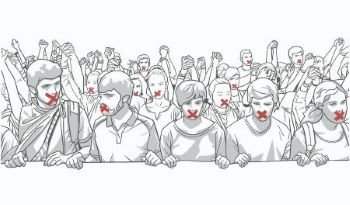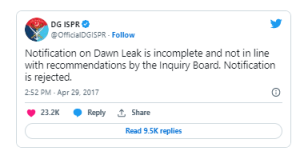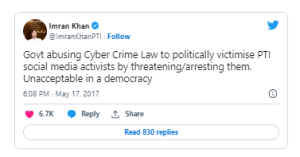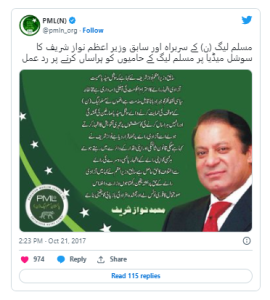Project Peca I: How to silence a nation
Farieha Aziz

When the PML-N government introduced the Prevention of Electronic Crimes Act (Peca), 2016 in parliament, it was projected as a shield against harassment and hate speech. At the time, authorities justified the draconian measures as a necessity — and many swallowed it, the memories of the Peshawar Army Public School (APS) attack fresh in their minds.
Enacted under these false pretences, the intent behind Peca stands well exposed today, having proven to be an effective weapon in the hands of the state, to harass, intimidate and silence critics.
The most recent casualty of Peca is the Pakistan Tehreek-e-Insaf’s (PTI) Senator Azam Swati, who has been entangled in so many cases across the length and breadth of the country, it is hard to keep count. But he isn’t alone.
Scores of politicians, journalists, activists and sometimes, even ordinary citizens, who dared pour out their frustrations on digital spaces have been hounded by law enforcement agencies ever since the law came into effect.
This attempt at silencing dissent is nothing new. The Pakistani state has a long history of using legal and illegal measures [enforced disappearances, for instance] to ensure everyone toes the line and protect the status quo. And yet, what we have seen under Peca is the state’s creativity of using the criminal justice system to harass, intimidate and silence critics for simply saying things that should never have been a crime in the first place.
A tool for political victimisation
Since 2017, Peca has been routinely used against political workers, journalists, academics, activists and citizens in general, who have been targeted through summons by the Federal Investigation Agency (FIA), FIRs under Peca as well as provisions of the PPC and other laws, including the ATA, followed by raids and arrests, for peddling an “anti-state” narrative or “defaming” public officials and state institutions online.
The treatment meted out to Swati, while condemnable, is not unheard of. While the law to prevent and criminalise custodial torture has only recently received the assent of the President of Pakistan, advocacy around the issue spans many years due to the frequency and prevalence of this practice against citizens. Swati is also not the first politician to be arrested for making “remarks against institutions” on social media.
In 2018, former Senator Faisal Raza Abidi was arrested for “anti-judiciary” remarks. An FIR under sections 10, 11 and 20 of Peca and sections 109 and 509 of the PPC was registered against Abidi, as well as Hans Masroor, the owner of a web channel Naya Pakistan, where the remarks were made, as well as the producer of the web channel, Ahsan Saleem. This FIR followed a previous one for the same act, under the Anti-Terrorism Act and various sections of the PPC.
In 2021, PPP MPA Masood ur Rehman Shamsi was issued a contempt notice by the Supreme Court and later also charged by the FIA under sections 10, 11 and 20 of Peca for his speech about the then chief justice. Eight other PPP MNAs and MPAs were issued notices by the FIA in connection with the investigation in Shamsi’s case.
What began under the PML-N government, intensified under PTI rule and is in vogue once again under the PDM government. Swati may be the latest casualty, but he is not the first and is unlikely to be the last.
Laying the groundwork
The ongoing disqualification case against Nawaz Sharif, disappearances of bloggers and levelling of allegations of anti-state propaganda and blasphemy against them, the vicious targeting of those campaigning for their release on mainstream media, and the rejection of the “Dawn leaks” inquiry report by then DG ISPR through a tweet, dominated the news cycle in the first half of 2017.
 In a press conference on May 13, 2017, then Interior Minister Chaudhry Nisar warned that “anti-institution propaganda would not be tolerated in the name of freedom of speech”, adding that “defamation laws and the cybercrime law would be used against those carrying out propaganda against the prime minister, his family and constitutional institutions of the state.”
In a press conference on May 13, 2017, then Interior Minister Chaudhry Nisar warned that “anti-institution propaganda would not be tolerated in the name of freedom of speech”, adding that “defamation laws and the cybercrime law would be used against those carrying out propaganda against the prime minister, his family and constitutional institutions of the state.”
The FIA subsequently claimed that several “suspects involved in an organised campaign against the armed forces on social media” had been identified. On May 17, 2017, Karachi-based lawyer Jibran Nasir tweeted a summon he had received from the FIA’s cybercrime circle. The same day, Salar Kakar, a member of the PTI’s social media team, was summoned to the FIA’s Islamabad office. Accusing the PML-N government of harassing PTI’s social media activists, Imran Khan tweeted that the government was “abusing the cybercrime law to politically victimise PTI social media activists.”

Over the next few days, several PTI supporters and workers, especially the social media team, were summoned and detained, while its party offices were raided and equipment seized.
The modus operandi
Taha Siddiqui, then an Islamabad-based journalist, received a phone call from an officer, who claimed to be speaking from the FIA’s counter-terrorism wing on May 18, 2017, instructing him to appear for questioning at the agency’s office. Prior to this, a list of names was already in circulation in which Siddiqui’s name was mentioned — the only journalist on it. After receiving the summons, Siddiqui filed a petition before the Islamabad High Court (IHC) on May 23, 2017 against intimidation and harassment by the FIA.

